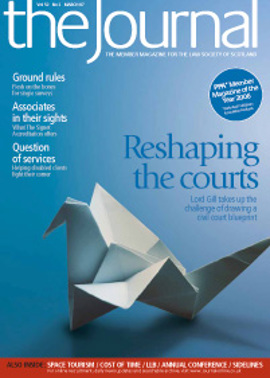Playing by the rules

The relationship between sporting bodies and the law is an intriguing and often complex one. Sport’s desire to regulate itself on-field with as little interference as possible from outside, including the law, can have further implications for issues of participation. Some recent developments in this area are of note.
International Convention Against Doping in Sport
The first global treaty against doping in sport came into force on 1 February 2007, having been ratified by the requisite 30 nations. The General Conference of the United Nations Educational, Scientific and Cultural Organization adopted the Convention on 19 October 2005. Its purpose is to “promote the prevention of and the fight against doping in sport, with a view to its elimination” (article 1).To achieve this, signatory nations (including Scotland as part of the UK) are obliged to adopt appropriate measures. These may include legislation, regulation, policies or administrative practices (article 5).The Convention applies across all sports. How the measures to be adopted by the UK interplay with the regulatory regimes of our respective sports will be followed with interest.At present the implementation and management of UK anti-doping policy is primarily the responsibility of UKSport and the sports councils (sportscotland, sportengland, etc). It is envisaged that such bodies and other stakeholders will be consulted in relation to any proposed legislation or regulations to be introduced.FIFA’s regulatory powers
FIFA’s ability to regulate participation in competitive football untroubled by traditional legal principles has in recent years been eroded by the increasing impact of employment law and EU laws, such as freedom of movement, most notably in cases such as that of Jean-Marc Bosman. In recent months the case of Andy Webster has focused attention on article 17 of the FIFA Regulations for the Status and Transfer of Players, which were created in the aftermath of the difficulties created by the Bosman decision and interference of the European Court of Justice. The regulations provide that outwith the “Protected Period” (three years’ service for a player whose contract was executed before he was 28, and two years for a player whose contract was executed after he was 28), a player may unilaterally break the remainder of his contract of employment and be entitled to transfer his registration certificate (his licence to play football) to a new club. Unless the contrary is stated in the contract, however, compensation will be payable to the club as a consequence, which, in terms of article 17, para 1 “shall be calculated with due consideration for the law of the country concerned, the specificity of sport, and any other objective criteria”.
Article 17 was introduced by FIFA in December 2004, with effect from 1 July 2005. Andy Webster is believed to be the first player to have invoked it, when moving from Heart of Midlothian to Wigan Athletic in summer 2006. The FIFA Dispute Resolution Chamber has yet to determine the compensation due; notwithstanding this, it is envisaged that more players will use the provisions now they have been put into operation. How the conflicting principles of domestic law and “the specificity of sport” will be reconciled in calculating compensation is eagerly anticipated. The view of FIFA’s Dispute Resolution Chamber and its reasoning will be keenly scrutinised, for unless its decision is plainly contrary to law or perverse given the facts, it is likely to stand. A recent judgment of the Swiss courts (to which FIFA is subject) affirmed FIFA’s power to regulate its sport through suitable regulations and decision-making processes (“_____ S.A.D. v Federation Internationale de Football Association (FIFA)” ({T 0/2} 4P.240/2006/len).
Civil v criminal
Sometimes, despite best efforts, sport cannot resist the influence of external agents and powers. Trevor Brennan, a professional rugby player with French club Toulouse and formerly an Ireland internationalist, could face criminal proceedings in France for allegedly punching a fan during a recent ERC Heineken Cup match. Attempts by his solicitor to halt disciplinary proceedings on the basis that they could prejudice any criminal proceedings were unsuccessful, with the ex parte application for injunction in the Irish courts (where the ERC is based) revoked after only 24 hours, the court ordering the ERC’s independent disciplinary procedure to be followed and the disciplinary committee to consider the question of prejudice. At the time of writing, the preliminary application for adjournment has been rejected and the hearing is to proceed on 16 March. One factor considered key by the committee was that if the player was to be subject to trial in France for alleged assault, his rights would be protected by virtue of article 6 of the European Convention on Human Rights and doubtless this would prevent any unfairness arising by virtue of his separate civil disciplinary proceedings.
Ross Thomson, Sports Practice Group, Harper Macleod LLP
In this issue
- A look in the mirror
- A welcome review
- Squaring the circle
- Profitability and financial structure
- Access-ability
- Culture change
- Practice? What practice?
- Signet badge takes wing
- Four in one
- Appreciation: Angus McLean
- In on the Acts
- "Lossiemouth, we have a problem"?
- Flagging up VAT
- In the family way
- Practice inside out
- Shape of things to come
- Breaking down a brick wall?
- Playing by the rules
- Scottish Solicitors' Discipline Tribunal
- Website reviews
- Book reviews
- Funny thing
- PIPs' hour approaches
- Enabled in the housing market
- Registers refresher






